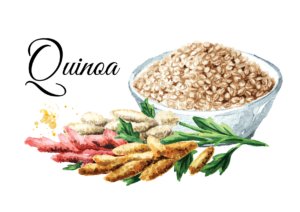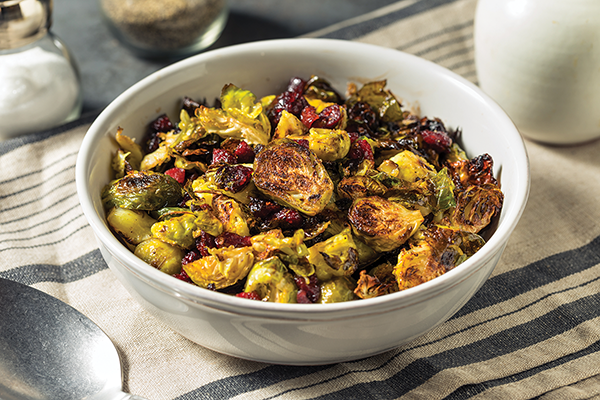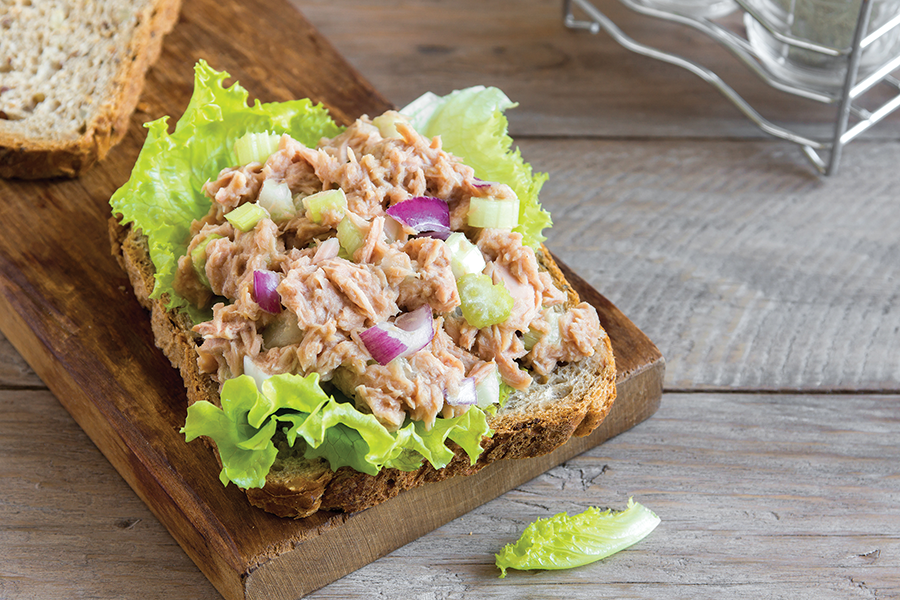 Quinoa has been a staple of the Andean region for thousands of years, and over the past decade it’s seen an increase in popularity worldwide. Although quinoa is often compared to cereal grains, it’s actually a pseudocereal, or a seed that is prepared and eaten like a grain.1,2 This super-seed is dense with nutrients that are essential for every diet.
Quinoa has been a staple of the Andean region for thousands of years, and over the past decade it’s seen an increase in popularity worldwide. Although quinoa is often compared to cereal grains, it’s actually a pseudocereal, or a seed that is prepared and eaten like a grain.1,2 This super-seed is dense with nutrients that are essential for every diet.
Nutrition
One cup of quinoa contains 8.14g of protein, 39.4g of carbohydrates, 3.55g of fat, and 32.6g of starch.3 Quinoa contains all nine essential amino acids, making it a complete protein;1,4 this is especially important for people who only consume plant-based foods, as it can be more difficult to consume adequate amounts of all amino acids on a plant-based diet. Furthermore, quinoa is a good source of lysine, an essential amino acid, having twice the lysine content of wheat, maize, and rice.4
The fat content of quinoa is largely made up of mono- and polyunsaturated fatty acids, and it is a good source of both linolenic (omega-3) and linoleic (omega-6) acids.4,6 Consuming unsaturated fatty acids can increase high-density lipoprotein (HDL) and decrease low-density lipoprotein (LDL), thus improving cholesterol.6
Quinoa is also rich in dietary fiber, with 5.18g per on cup,3 or about 15 to 18 percent of the recommended daily value, depending on age and sex.2,5 Eating enough fiber is important—fiber decreases the risk of constipation, high blood pressure, and high cholesterol.5
In addition to its macronutrient content, quinoa is also an excellent source of various vitamins and minerals.1,2,4–6 One cup contains 2.76mg of iron, 118mg of magnesium, 1.17mg of manganese, 281mg of phosphorus, 77.7µg of folate, and 0.198mg of thiamine (vitamin B1).3 Furthermore, quinoa contains powerful antioxidants, including vitamin E, quercetin, and kaempferol.2,4,5 Vitamin E is associated with a decreased risk of certain cancers, coronary heart disease, and eye disorders,5 while quercetin and kaempferol protect cells from damage from free radicals.2 The numerous phenolic acids in quinoa help improve metabolism and cell signaling and regulate the gut microbiome, which can protect against cancer, diabetes, cardiovascular disease, and obesity.4
Health Benefits
Quinoa is gluten-free, thus providing a healthy, nutrient-dense grain alternative for those with gluten intolerance.1,2 Additionally, quinoa has a lower glycemic index than gluten-free bread, which reduces the presence of free fatty acids4 and can be particularly beneficial for individuals with diabetes.
Studies have shown that consumption of quinoa-enriched products among adults led to reduced LDL and triglyceride levels, which could help prevent cardiovascular disease. One study showed that quinoa improved metabolic parameters in postmenopausal women. However, the sample sizes were small, so larger studies must been done to corroborate these findings.4,7
Bottom Line
You can’t go wrong with quinoa on your plate. Use it instead of rice in your favorite stir fry, stir in some fruit for a protein-packed breakfast, or pop it like popcorn for a quick treat. There are so many ways to experiment with quinoa—you’ll never grow tired of eating it!
Sources
- Harvard TH Chan School of Public Health. Quinoa. https://www.hsph.harvard.edu/nutritionsource/food-features/quinoa/. Accessed 14 Mar 2023.
- Kubala J, Gunnars K. 8 evidence-based health benefits of quinoa. Healthline. Updated 26 Feb 2023. https://www.healthline.com/nutrition/8-health-benefits-quinoa. Accessed 14 Mar 2023.
- United States Department of Agriculture. Quinoa, cooked. https://fdc.nal.usda.gov/fdc-app.html#/food-details/168917/nutrients. Accessed 14 Mar 2023.
- Hussain MI, Farooq M, Syed QA, et al. Botany, nutritional value, phytochemical composition and biological activities of quinoa. Plants (Basel). 2021;10(11):2258.
- Ware M. Health benefits of quinoa. MedicalNewsToday. 15 Nov 2019. https://www.medicalnewstoday.com/articles/274745#benefits. Accessed 14 Mar 2023.
- Food and Agriculture Organization of the United Nations Regional Office of for Latin America and the Caribbean. Quinoa: An ancient crop to contribute to world food security. Jul 2011. https://www.fao.org/3/aq287e/aq287e.pdf. Accessed 14 Mar 2023.
- Graf BL, Rojas-Silva P, Rojo LE, et al. Innovations in health value and functional food development of quinoa (Chenopodium quinoa Wild.). Compr Rev Food Sci Food Saf. 2015;14(4):431–445.





